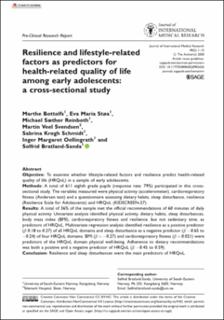Resilience and lifestyle-related factors as predictors for health-related quality of life among early adolescents: a cross-sectional study
Bottolfs, Marthe; Støa, Eva Maria; Reinboth, Michael Sæther; Svendsen, Martin Veel; Schmidt, Sabrina Krogh; Oellingrath, Inger Margaret; Bratland-Sanda, Solfrid
Peer reviewed, Journal article
Published version
Permanent lenke
https://hdl.handle.net/11250/2740638Utgivelsesdato
2020Metadata
Vis full innførselSamlinger
Originalversjon
Bottolfs, M., Støa, E. M., Reinboth, M. S., Svendsen, M. V., Schmidt, S. K., Oellingrath, I. M., & Bratland-Sanda, S. (2020). Resilience and lifestyle-related factors as predictors for health-related quality of life among early adolescents: A cross-sectional study. Journal of International Medical Research, 48(2). https://doi.org/10.1177/0300060520903656Sammendrag
Objective To examine whether lifestyle-related factors and resilience predict health-related quality of life (HRQoL) in a sample of early adolescents. Methods A total of 611 eighth grade pupils (response rate: 79%) participated in this cross-sectional study. The variables measured were physical activity (accelerometer), cardiorespiratory fitness (Andersen test) and a questionnaire assessing dietary habits, sleep disturbance, resilience (Resilience Scale for Adolescents) and HRQoL (KIDSCREEN-27). Results A total of 36% of the sample met the official recommendations of 60 minutes of daily physical activity. Univariate analysis identified physical activity, dietary habits, sleep disturbances, body mass index (BMI), cardiorespiratory fitness and resilience, but not sedentary time, as predictors of HRQoL. Multivariate regression analysis identified resilience as a positive predictor (β 0.18 to 0.27) of all HRQoL domains and sleep disturbance as a negative predictor (β −0.65 to −0.24) of four HRQoL domains. BMI (β = −0.27) and cardiorespiratory fitness (β = 0.021) were predictors of the HRQoL domain physical well-being. Adherence to dietary recommendations was both a positive and a negative predictor of HRQoL (β −0.45 to 0.59).

